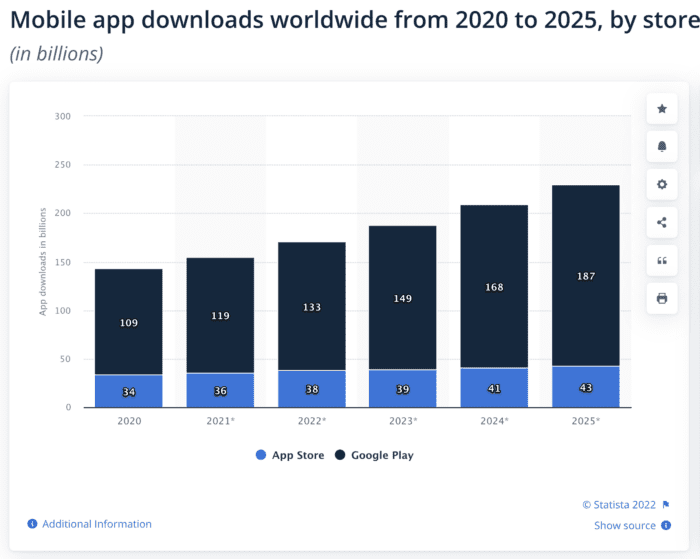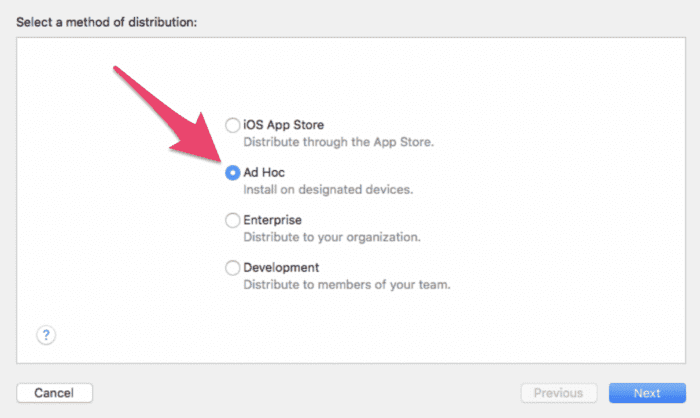Publishing an iOS app on the Apple App Store is not mandatory. As an app developer, you actually have multiple distribution methods to consider.
The App Store is definitely the best option for mass distribution. But if you’re creating an internal mobile app for your business or custom apps for B2B purposes, you may want to keep the app private and only available for certain users.
Think about it—you wouldn’t want a random person to access an app built for your employees, right? In this scenario, you need more control over each mobile device that the app gets installed on. The public App Store isn’t an option.
This simple guide will show you exactly how to distribute your iOS app without using the Apple App Store. Let’s dive in.
Distribute iOS App Without App Store
Most iOS apps are made for the Apple App Store. But the App Store is public and gives anyone with an iOS device the opportunity to download.
According to Statista, more than 43 billion apps will be downloaded from the App Store in 2025.

As you can see from the graph, the Google Play Store is projected to have more than four times the number of app downloads that same year. This is largely due to Android dominating the global market share.
But it’s also worth noting that Apple has a much stricter approval process for developers that want to publish an app to the App Store.
This same concept holds true for private app distribution. Compared to Android, distributing apps outside of the App Store is much more complicated for iOS apps. Apple does offer a few options for specific use cases. But the direct download and installation of any iOS binary files is strictly prohibited by Apple.
Apple’s Solutions for Alternative App Distribution
There are three ways to distribute an iOS app without the App Store:
- Apple Developer Program — The Apple Developer program makes it possible to distribute apps for testing purposes only.
- Apple Developer Enterprise Program — The Apple Enterprise Program is intended for organizations that want to distribute apps internally and privately to employees.
- Volume Purchase Program for Enterprises — The VPP app deployment method allows organizations to create a private app store to manage apps in bulk, typically used for custom B2B apps and MDM (mobile device management).
We’ll discuss each of these distribution methods in greater detail below, so you can find the best alternative to Apple App Store distribution.
Beta App Distribution Using the Apple Apple Developer Program
This iOS app distribution method is designed specifically for testing. Developers can distribute a prerelease version of an app to a specific group of people for beta testing purposes.
You must have an Apple Developer Program account to do this. The Apple Developer Program membership costs $99 per year. Nonprofits, government entities, and educational institutions might be eligible for a fee waiver.

This is the only scenario where an app intended for a mass audience can be distributed privately. But the distribution is only allowed during the testing stage and limited to a certain number of devices. Beta distributions are limited to 100 iPhones, 100 iPads, and 100 iPod touch installations.
Releasing your app to beta testers won’t be the same as distributing a fully complete, fully functioning, ready-for-release app.
It’s important to know that your app is protected from being copied or redistributed during the beta testing distribution.
Ad-Hoc Deployment Using the Apple Developer Program
For private beta testing or temporary distribution, Apple allows developers to use the Ad-hoc app deployment method. In this scenario, the developer will deliver the app binary to each unique user via a download URL or email.
To ensure the app binary works on the intended device, developers are required to register each device to the Apple Member Center and include the UDID for the device. App binaries will not run on an iOS device until the registration has been completed. This process protects your app from being duplicated or redistributed without your approval.
You’ll see this option in Xcode when generating the IPA, open the Organizer, and navigate to Archives.

Pros of Ad-Hoc Deployment
- No need for iOS approval process
- App is private and cannot be installed by the public
- Apple Developer Account profile is valid for one year
Cons of Ad-Hoc Deployment
- Limited to 100 devices
- Manually UDID registration is required for each device with a provisioning profile
Upgrading to the Apple Developer Enterprise Program
The Apple Developer Enterprise Program is designed for large organizations that want to distribute internal apps to employees. The Enterprise Program allows for internal distribution through secured internal systems or through MDM (mobile device management) solutions.

Unlike a regular App Store Connect account, not everyone is eligible for an enterprise account. It’s only for internal use of proprietary apps in scenarios that can’t be addressed through the public Apple App Store, Apple Business Manager, beta testing, or Ad Hoc distribution. The app must be developed by the organization and specifically for use on Apple platforms.
Other eligibility requirements include:
- Minimum of 100+ employees.
- Must be a legal entity (no DBAs, trade names, fictitious names, etc.)
- Program must be used for internal in-house apps for employees.
- Must have measures to ensure the app is only available for employees and all membership credentials are protected.
- Must pass Apple’s verification process and continuous evaluations.
Pricing for a Developer Enterprise Program account costs $299 per year for a distribution certificate. If you’re already enrolled in the Apple Developer Program for distributing apps through the public Apple App Store, you’ll need a separate Apple ID for the Enterprise Program.
In-House Deployment With the Apple Developer Enterprise Program
The in-house deployment option is great for larger organizations that want to distribute custom internal apps for employees. This can be a useful initiative for your citizen developer program. It also helps corporations get more control over app security and device security through MDM—mobile device management.
Pros
- No App Store approval process
- You have full control over who can access and use the app
- Ideal for internal distribution to employees
Cons
- Only for larger businesses
- Strict eligibility requirements
Apple’s Volume Purchase Program (VPP) for B2B App Distribution
The Volume Purchase Program, VPP, makes it possible for organizations and educational institutions to buy corporate apps in bulk and deploy them to iPhones, iPads, and Macs within the organization.
For example, a school that provides students with Macbooks can use the VPP to pre-install different applications on those devices prior to distribution.
The Volume Purchase Program also supports custom B2B apps that can be distributed through a private app store instead of the public Mac App Store.

Larger organizations could use this program to share apps with other businesses, vendors, and partners that work closely with the company.
This is another scenario where you can create custom apps and distribute them privately without going through the App Store. Let’s say you create a custom business workflow app that involves vendors working with your company. You could grant them access to the app through a private app store using the VPP. It’s also common for organizations to use this distribution method for MDM.
Note: The Volume Purchase Program is no longer available as of January 14, 2021
You can upgrade to Apple School Manager or Apple Business Manager to access similar benefits offered through the VPP. See more information from Apple here.
Android App Distribution Without Google Play
While we’re on the subject of distributing apps without app stores, I wanted to quickly touch base on how the Android app development and Google Play process is different from alternative distribution methods.
As previously mentioned, the iOS process is a bit difficult. It’s much more straightforward to distribute Android apps without going through the Google Play Store.
You can do this through a direct webpage link or direct email for download. Android apps are also easier to distribute through a third-party app marketplace.
Refer to this Android developers resource on alternative distribution options for more information.
iOS App Distribution Methods in Summary
Most developers will want to use the Apple App Store for iOS app distribution. This is the best way to get your app in the hands of the widest possible audience.
But there are some scenarios that require an app to be kept private. Distributing internal employee apps or private business apps is the most common reason to avoid the App Store.
Some apps just aren’t made for public use. If you fall into this category, you can use the Apple Developer Program or Apple Developer Enterprise Program as a solution. The former is best for beta testing, and the latter is intended for the internal distribution of an enterprise app.
Interested in creating an internal workforce app for your business?
We can help. BuildFire’s custom app development solutions are perfect for larger organizations and enterprises. We’ve built workforce apps for compliance, employee communication, business workflows, field sales, field service workers, employee safety, HR, employee onboarding, scheduling, and more. Reach out for a free consultation and book a strategy session to learn more.